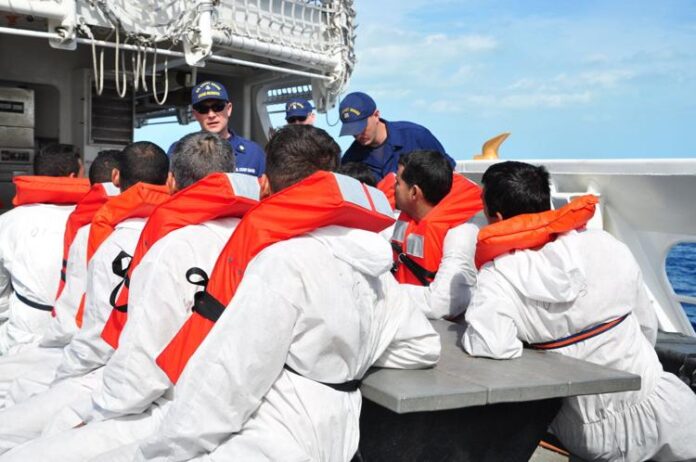
By Casey Harper | The Center Square
The number of migrants caught by the Coast Guard trying to illegally enter the U.S. has doubled in recent years. That’s according to a witness who testified Tuesday at a U.S. House hearing on the rise of small vessels sneaking drugs and illegal immigrants into the country.
“The Coast Guard interdicted more than 12,000 migrants in both fiscal year 2022 and 2023 – more than double the fiscal year 2021 total, according to Coast Guard data,” Heather MacLeod, director of Homeland Security and Justice at the Government Accountability Office, said in prepared testimony.
MacLeod said the U.S. should expect that number to rise. The number of illegal immigrants attempting to come into the U.S. via the southern border has exploded since President Joe Biden took office. Water transport, though, could allow groups to ship larger quantities of drugs if they can arrive undetected.
For instance, the Department of Justice announced in 2021 that six Colombian nationals had pleaded guilty to conspiracy to use “narco-submarines” to smuggle nearly 20,000 kilos of cocaine to the Sinola Cartel.
Coast Guard and Maritime Transportation Subcommittee Chairman Daniel Webster, R-Fla., led the hearing, which examined the Coast Guard’s role in policing these waters. Cartels and other groups use small vessels to ship drugs into the U.S., and migrants can attempt the voyage in vessels that are hardly seaworthy.
Webster pointed out that 2023 was one of the deadliest years for makeshift vessels seeking to make the U.S. mainland.
“The Coast Guard is our nation’s premier maritime law enforcement agency and is actively engaged in countering illicit maritime activity,” Webster said in his opening remarks. “This includes stopping the flow of illegal drugs to our shores, interdicting illegal maritime migration, and protecting the environment through efforts to curb illegal fishing.”
Rear Admiral Jo-Ann Burdian, Assistant Commandant for Response Policy at the U.S. Coast Guard, echoed the concern about transnational criminal organizations and their role in the American drug crisis. Tens of thousands of Americans have died from fentanyl in recent years.
“They traffic drugs, weapons, wildlife, and humans, which causes instability and violence in Central America, the Caribbean, and elsewhere, driving irregular migration to the United States,” Burdian testified. “Illicit drugs destined for the United States devastate American families, leading to record-setting drug-related deaths in recent years.
“Drug trafficking also destabilizes nations in the region, undermines the rule of law, threatens citizens, and drives individuals, families, and unaccompanied children to migrate to the United States.”
Webster also pointed to the danger of overfishing from unauthorized vessels, another issue for the Coast Guard to take on.
“In 2020, the Coast Guard declared that IUU fishing replaced piracy as the leading global maritime security threat. It harms the management of fish stocks and costs legal fishing operators tens of billions of dollars a year in revenue,” Webster said at the hearing. “This harm is exacerbated by the world’s biggest IUU offender – China. The Chinese Communist Party provides billions of dollars in subsidies to their distant-water fishing fleet to plunder the fishing stocks of other nations.”
Republished with the permission of The Center Square.













